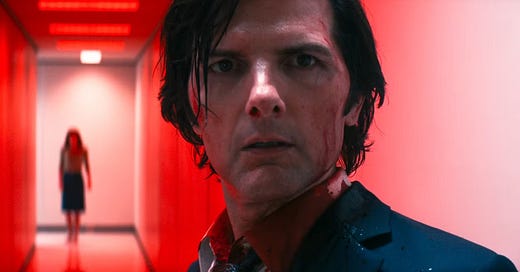What Cannot Be Severed
There are certain pieces of television, rare and startling, that feel less like shows and more like prayers. They’re softly spoken, deeply anguished, reaching not toward entertainment but toward understanding. Severance, the quietly harrowing series from Ben Stiller and Dan Erickson, is one of them. It asks a question so profound we almost missed it: What if you could separate your work self from your home self, the inner from the outer, the soul from the task? And it answers, quietly but unmistakably: You already have.
I watched it alone, late, the city outside gone quiet in the small hours. The show felt both intimate and enormous. A fable dressed as a thriller, with bright lights and crisp hallways, its corporate setting sterile yet almost holy in its monotony. It reminded me, strangely, of old churches—beautiful, orderly, and a little frightening.
At the center of it is the heartache of compartmentalization. The notion that you can carve yourself in two, place half in a cubicle and the other half in a home, and call that balance. But as Severance so carefully reveals, there is no freedom in forgetting your pain, only the deadness of its absence. The severed workers, “innies,” they call them, live only within office hours, trapped in an eternal now of break rooms and endless data refinement. They are, in some way, our most modern metaphor: the person who is always performing, always producing, and never whole.
The show’s climax, where everything is teetering on discovery, on escape, on heartbreak, lands with the feathered weight of a revelation. And then comes the song. Ah, that song.
“The Windmills of Your Mind.”
It floats in, unexpected, like a ghost you knew in childhood. Michel Legrand’s melody, with its sad, whirling elegance, begins not as a closing note, but as a deepening of what we’ve seen. It is the perfect choice, the only choice. The lyrics spiral:
“Like a circle in a spiral, like a wheel within a wheel…”
It is a song about memory, about the quiet terror of your own thoughts, the constant churning of an unquiet mind. And placed here, at the end of Severance’s second season, it becomes something else entirely. It becomes the lament of the self trying to stitch itself back together. Of the human spirit gasping, blinking in the light, trying to remember what it means to be a whole person. You hear the music and think, Yes. That’s what it’s like inside. That’s the sound of the private self.
The beauty of the scene lies in its restraint. No one shouts. No one explains. But you feel it. Like a crack in the dam, like water finding its way through stone. There’s Mark, the broken man, remembering his wife. There’s Helly, the rebel, discovering who she is on the outside. And Irving, my heart’s favorite, carrying around a little can of paint and a sea of sorrow. They do not know what they will become, but they have touched the truth: that their pain is real, and that it matters.
The song plays over it all, and for a moment, you can’t breathe.
So much modern storytelling is about what happens—plot points, twists, spectacle. But the best stories, the enduring ones, are about what it feels like to be a person. That’s what Severance is. Not a show, really, but a hymn.
And when that song begins, it is like the soul remembering itself. A circle in a spiral. A wheel within a wheel. The windmills of your mind turning, turning—until you finally remember that you are, and always have been, whole.



